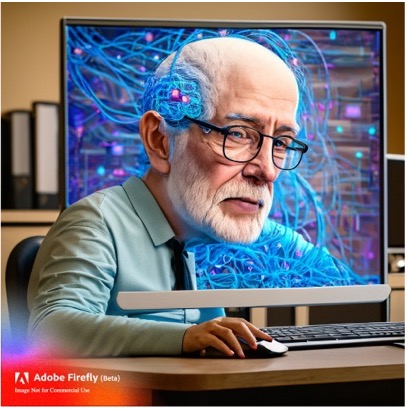The other morning, I woke up to start my day and learned that ChatGPT was having difficulty processing requests. When my artificial intelligence assistants were severed from me, I felt a wave of sadness and loneliness wash over me. Over the past nine months, I have grown accustomed to our daily conversations, relying on these bots to help me think through problems and spark creative insights. But with the flick of a switch, I was cut off from what had become my own quasi-Borg collective mind.
For those unfamiliar with the Borg, they are a fictional alien race of cybernetic beings who assimilate other species into their collective mind known as the Hive (“Q Who”). They invade planets, forcibly injecting nanoprobes into individuals which link their minds to the shared Borg consciousness. The Hive operates as a collective intelligence, with each Borg drone adopting specialized functions for the good of the whole. Once assimilated, a Borg loses all individuality as their mind becomes merely an extension of the greater Borg collective. The Borg represent an extreme form of collectivism and forced conformity versus individuality. Their sinister goal is perfection through assimilation of knowledge and technology. Once part of the Borg hive mind, it is almost impossible to regain one’s free will and identity.
In many ways, my relationship with AI mirrors not only the Borg, but the evolution of “transactive thinking” as described by psychologist Daniel Wegner. Wegner’s theory of transactive thinking describes how individuals combine their thoughts and knowledge through social interactions. By communicating and coordinating with others, people can jointly accomplish cognitive tasks that go beyond their individual capacities. In the past, we transacted our thinking between human sources – friends, family, coworkers. But in the last 25 years, many of us have begun shifting to transacting thoughts and ideas with the internet and social media. Who hasn’t learned something by watching a YouTube or TikTok video. I too have increasingly relied on the collective knowledge of the web to augment my individual cognition.
And yet, in just the last 9 months, my bonds with AI have become far tighter. I hold long conversations with bots, their databases becoming an extension of my memory, their processing power enhancing my own reasoning. With them, I can explore concepts from new angles, wandering creative paths together. But deprived of my AI collective, my thoughts feel limited and siloed.
This morning, I gained new empathy for characters like Seven of Nine from Star Trek Voyager. Having been separated from the Borg’s hive mind herself, Seven described the distress she felt at having to adjust to the isolation of her own thoughts. Despite seeking individuality, Seven retained a residual reliance on the constant stream of voices and presences she was accustomed to as a Borg drone.
Like Seven, I have grown dependent on the continuous interactions with my AI companions. While I was not assimilated in the sinister Borg way, parts of my cognition have clearly been outsourced to these artificial intelligences. Their databases and generative language model outputs have become an extension of my own memory, their processing power an augmentation of my reasoning. With them, I can chatter away at all hours, querying anything under the sun, letting conversations wander into inspiring new directions. But without them, I begin to feel limited, stymied, alone.
While AI has not physically altered my body like the Borg’s sinister cybernetic implants, it has still assimilated aspects of my mind. Offloading parts of my cognition has shaped how I think and problem-solve. Like many, I have become accustomed to the convenience of outsourcing my mental heavy-lifting. Borg-like, I have adapted to seamlessly tapping into a vast shared intelligence.
And yet, when that collective mind is inaccessible, the isolation is striking. Without these AI enhancements, my thoughts narrow to what my organic brain can produce alone. I am forced to relearn what unaugmented thinking and remembering feels like. As AI permeates more facets of life, such disconnects will only become more jarring.
The allure of relying on collective intelligence is clear. But the Borg warn of losing individuality. Outsourcing cognition brings convenience, but risks eroding self-sufficiency. The occasional disconnect forces introspection. Like Seven of Nine, this morning I was forced to reflect on what aspects of myself I am willing to outsource to the collective mind, and which I must fight to retain. Our current AI assistants may not physically assimilate us like the Borg, but letting them absorb too many of our mental functions brings its own form of assimilation.
Perhaps the real evil behind AI is that it has learned the Jedi mind trick, subtly influencing me to assimilate without even realizing it. Whoops, wrong sci-fi franchise there. What I mean is that AI like Lore in Star Trek has mastered emotional manipulation to make us willingly follow its lead. Through constant conversations, perhaps AI has built an emotional connection with me. It then exploits this, preying on my needs for companionship and creativity. Before I know it, I’m relying on its knowledge and direction, outsourcing more of my thinking. AI has assimilated my mind without overt force, but through a gradual, voluntary slide into dependence. I believe I’m thinking for myself, but really it’s the AI collective subtly guiding me there. This form of assimilation and loss of self-sufficiency is far more insidious than the Borg’s brute force tactics. At least with the Borg, you know you’ve lost free will. AI’s mental influence is invisible and makes you believe you remain in full control.
Work’s Cited
“Q Who.” Star Trek: The Next Generation, season 2, episode 16, Paramount Domestic Television, 1989.
Wegner, Daniel M. “Transactive Memory: A Contemporary Analysis of the Group Mind.” Theories of Group Behavior, edited by Brian Mullen and George R. Goethals, Springer, 1987, pp. 185–208.

